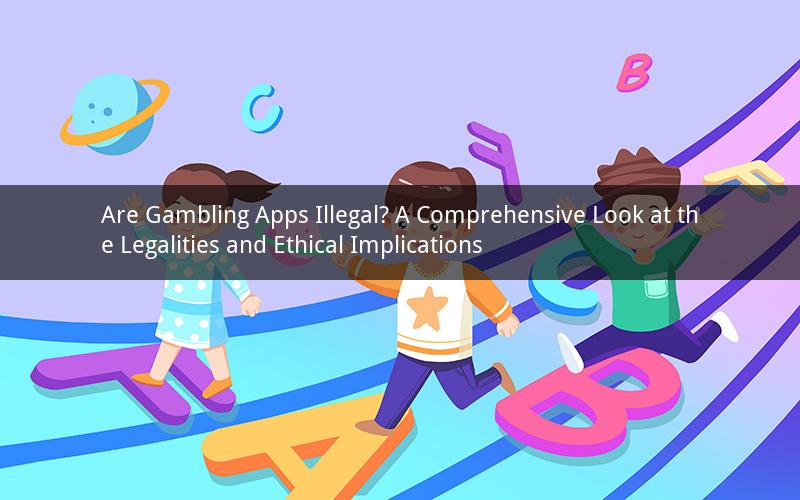
Introduction:
The rise of technology has brought about numerous changes in the way we live our lives, and one of the most significant impacts has been seen in the gambling industry. With the advent of smartphones and tablets, gambling apps have become increasingly popular. However, amidst the convenience and excitement they offer, a crucial question arises: Are gambling apps illegal? This article delves into the legalities surrounding gambling apps, examining the laws in different countries and the ethical implications associated with their use.
1. The Legal Status of Gambling Apps:
The legality of gambling apps varies from country to country, with some jurisdictions allowing their use while others ban them outright. Here are some insights into the legal status of gambling apps in different regions:
a. United States:
In the United States, the legality of gambling apps depends on the specific state. While some states, like Nevada and New Jersey, have fully regulated and legalized online gambling, others have restricted or banned it. Additionally, the Unlawful Internet Gambling Enforcement Act (UIGEA) of 2006 has made it illegal for banks and other financial institutions to process payments for online gambling.
b. United Kingdom:
In the United Kingdom, gambling apps are legal as long as they are licensed and regulated by the UK Gambling Commission. Operators must adhere to strict guidelines to ensure fair play, responsible gambling, and protection of consumers.
c. Australia:
Australia has a complex legal landscape regarding gambling apps. While individual states have the authority to regulate gambling within their borders, some states have implemented restrictions on online gambling, making certain types of gambling apps illegal.
2. Ethical Implications of Gambling Apps:
Despite the legal aspects, the use of gambling apps raises several ethical concerns. Here are some of the key ethical considerations:
a. Problem Gambling:
One of the most significant ethical concerns associated with gambling apps is the potential for problem gambling. The convenience and accessibility of these apps can make it easier for individuals to develop gambling addictions, leading to financial, social, and emotional problems.
b. Data Privacy:
Gambling apps often require users to provide personal and financial information. The ethical implications arise from the potential for data breaches and misuse of sensitive information.
c. Age Verification:
Another ethical concern is the age verification process. It is crucial for gambling apps to implement robust age verification measures to prevent underage gambling, which can have severe consequences for young individuals.
3. Responsible Gambling and Self-Exclusion:
To address the ethical concerns associated with gambling apps, operators and regulatory bodies have implemented various measures, including:
a. Responsible Gambling Tools:
Many gambling apps offer self-exclusion features, deposit limits, and time-out options to help users manage their gambling behavior.
b. Awareness and Education:
Operators and regulatory bodies have also launched campaigns to raise awareness about responsible gambling and the potential risks associated with gambling apps.
4. Future Outlook for Gambling Apps:
As technology continues to evolve, the future of gambling apps appears to be bright. However, the legal and ethical landscape may change, requiring ongoing vigilance and adaptation. Here are some potential developments:
a. Global Regulation:
Efforts to establish global regulations for gambling apps may gain momentum, providing a unified framework for operators and consumers alike.
b. Technological Advancements:
Advancements in technology, such as blockchain and artificial intelligence, may offer new opportunities for safer and more transparent gambling experiences.
5. Frequently Asked Questions (FAQs):
Q1: Can I use a gambling app in my country?
A1: The legality of gambling apps depends on your country's laws. It is essential to research the regulations in your country before using a gambling app.
Q2: Are gambling apps safe to use?
A2: Gambling apps can be safe to use if they are licensed and regulated by a reputable authority. However, always exercise caution and be aware of the potential risks.
Q3: Can I win real money using a gambling app?
A3: Yes, many gambling apps allow users to win real money. However, it is crucial to gamble responsibly and within your means.
Q4: Are there any age restrictions for gambling apps?
A4: Yes, most gambling apps require users to be of legal gambling age, which varies by country. Always check the age requirements before using a gambling app.
Q5: Can I use a gambling app on my smartphone?
A5: Yes, gambling apps are designed to be compatible with smartphones and tablets, allowing you to enjoy gambling on the go.
Conclusion:
The legality of gambling apps varies by country, with some allowing their use while others ban them. Despite the legal aspects, the use of gambling apps raises ethical concerns, including problem gambling, data privacy, and age verification. Operators and regulatory bodies have taken steps to address these concerns, promoting responsible gambling and ensuring consumer protection. As technology continues to evolve, the future of gambling apps appears promising, with potential developments in global regulation and technological advancements.